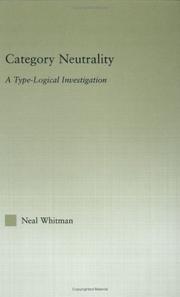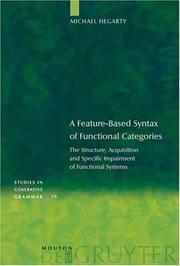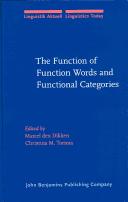| Listing 1 - 4 of 4 |
Sort by
|

ISBN: 128219397X 9786612193972 3119159778 311019760X 3110184656 9783110184655 9783110197600 9781282193970 6612193972 9783119159777 Year: 2005 Publisher: Berlin New York Mouton de Gruyter
Abstract | Keywords | Export | Availability | Bookmark
 Loading...
Loading...Choose an application
- Reference Manager
- EndNote
- RefWorks (Direct export to RefWorks)
This book proposes a new model of phonology that integrates rules and repairs triggered by markedness constraints in a classical derivational model. In developing this theory, the book offers new solutions to many long-standing problems involving syllabic and segmental phonology with analyses of natural language data, both well-known and relatively unknown. The book also includes a new treatment of Palatalization and Affrication processes, a novel theory of feature visibility as an alternative to feature under specification and an extensive critique of Optimality Theory.
Grammar, Comparative and general --- Markedness (Linguistics) --- Economy (Linguistics) --- Distinctive features (Linguistics) --- Optimality theory (Linguistics) --- Optimality (Linguistics) --- Optimization (Linguistics) --- Generative grammar --- Componential analysis (Linguistics) --- Linguistics --- Efficiency (Linguistics) --- Linguistic economy --- Linguistic analysis (Linguistics) --- Marked member (Linguistics) --- Phonology --- Phonology. --- Philology --- Grammar, Comparative and general Phonology

ISBN: 1135876762 1135876770 1280236337 9786610236336 0203495381 9780203495384 661023633X 0415970946 9780415970945 9781135876777 9781135876722 113587672X 9781135876760 9781138969971 1138969974 Year: 2005 Publisher: New York Routledge
Abstract | Keywords | Export | Availability | Bookmark
 Loading...
Loading...Choose an application
- Reference Manager
- EndNote
- RefWorks (Direct export to RefWorks)
""Feature neutrality"" is an issue that has received much attention among linguists. For example, consider the sentence, ""I have never, and will never, put my name on this document."" Here, the verb 'put' acts simultaneously as a past participle (as in ""have never put"") and a base form (as in ""will never put""), and is therefore said to be neutral between the two forms. Similar examples have been found for many languages. The accepted wisdom is that neutrality is possible only for morphosyntactic features such as verb form, gender, number, declension class-not at the level of gross syntact
Grammar, Comparative and general --- Semantics. --- Neutralization (Linguistics) --- Linguistics --- Language and languages --- Syntax --- Formal semantics --- Semasiology --- Semiology (Semantics) --- Comparative linguistics --- Information theory --- Lexicology --- Meaning (Psychology) --- Categories, Grammatical --- Grammatical categories --- Categorization (Linguistics) --- Componential analysis (Linguistics) --- Grammatical categories. --- Syntax. --- Phonology --- Major form classes --- Semantics --- 801.56 --- 801.56 Syntaxis. Semantiek --- Syntaxis. Semantiek --- Philology --- Grammar, Comparative and general Syntax

ISBN: 3110895404 9783110895407 3110184133 9783110184136 Year: 2005 Publisher: Berlin Mouton de Gruyter
Abstract | Keywords | Export | Availability | Bookmark
 Loading...
Loading...Choose an application
- Reference Manager
- EndNote
- RefWorks (Direct export to RefWorks)
This book develops ideas of Minimalist syntax to derive functional categories from the partially-ordered features expressed by functional elements, thereby dispensing with functional categories as primitives of the theory. It generalizes attempts to do this in the literature, while drawing significant empirical consequences from general constraints formulated to block overgeneration. The resulting theory of the construction of functional categories is applied to various problems in syntactic analysis and comparative and historical syntax, including variation across Germanic languages in patterns of verb-second and in the occurrence of expletive subjects in existential constructions, verb positions in Old and Middle English, problems regarding the placement of clitic pronouns in Romance languages and Modern Greek, and some previously unexamined structures of reduced clause coordination in colloquial English. Facts from early stages of the acquisition of syntax are shown to follow from the mechanisms for the projection of functional features as functional categories, exercised before all of the features for a language, along with their ordering and feature co-occurrence restrictions, have been acquired. It is observed that child acquisition of functional elements exhibits successive developmental stages, each characterized by the number of clausal functional elements which can be represented together within a clause. This, and facts regarding the lag in development of functional categories by children with specific language impairment, are shown to be not entirely reducible to limitations in working memory or processing capacity, but to depend in part on the growth of representational resources for the projection of functional categories.
Grammar, Comparative and general --- Functionalism (Linguistics) --- English language --- Language acquisition. --- Language disorders. --- Language and languages --- Syntax --- Functional analysis (Linguistics) --- Functional grammar --- Functional linguistics --- Functional-structural analysis (Linguistics) --- Grammar, Functional --- Grammatical functions --- Linguistics --- Structural linguistics --- Categories, Grammatical --- Grammatical categories --- Categorization (Linguistics) --- Componential analysis (Linguistics) --- Dysphasia --- Communicative disorders --- Acquisition of language --- Developmental linguistics --- Developmental psycholinguistics --- Language development in children --- Psycholinguistics, Developmental --- Interpersonal communication in children --- Psycholinguistics --- Grammatical categories. --- Syntax. --- Grammar, Historical. --- Major form classes --- Acquisition --- Grammar --- Germanic languages --- Philology --- Grammar, Comparative and general Syntax

ISBN: 1282156624 9786612156625 902729433X 9789027294333 9027228027 Year: 2005 Publisher: Amsterdam Philadelphia J. Benjamins Pub.
Abstract | Keywords | Export | Availability | Bookmark
 Loading...
Loading...Choose an application
- Reference Manager
- EndNote
- RefWorks (Direct export to RefWorks)
This volume brings together papers which address a range of issues regarding the syntax of function words and functional categories in the Germanic languages. The works offered in this volume derive specifically from comparative studies of Germanic; at the same time they all bear directly on long-standing problems in syntactic theory and universal grammar. The contributions include novel theoretical and empirical approaches to infinitives, the syntax and acquisition of Verb Second, the structure and interpretation of present tense, the syntax and semantics of reflexives, the relationship between expletive syntax and the EPP, the syntax of possession, and the DP-internal syntax of pronouns. Some contributions present the results of experimental research which provide an entirely fresh perspective on previously unchallenged claims.
Grammar, Comparative and general --- Functionalism (Linguistics) --- Categories, Grammatical --- Grammatical categories --- Categorization (Linguistics) --- Componential analysis (Linguistics) --- Functional analysis (Linguistics) --- Functional grammar --- Functional linguistics --- Functional-structural analysis (Linguistics) --- Grammar, Functional --- Grammatical functions --- Linguistics --- Structural linguistics --- Closed-class words (Grammar) --- Empty words (Grammar) --- Form words (Grammar) --- Function words (Grammar) --- Functors (Grammar) --- Grammatical words (Grammar) --- Structural words (Grammar) --- Function words. --- Grammatical categories. --- Major form classes --- Closed-class words --- Empty words --- Form words --- Functors --- Grammatical words --- Structural words --- 801.56 --- 801.56 Syntaxis. Semantiek --- Syntaxis. Semantiek --- Function words --- Philology
| Listing 1 - 4 of 4 |
Sort by
|

 Search
Search Feedback
Feedback About UniCat
About UniCat  Help
Help News
News